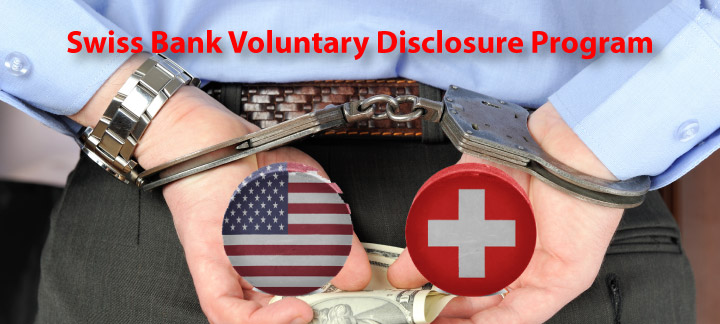The Special Disclosure Program for Swiss Banks and the Department of Justice
In recent months the number of US Department of Justice prosecutions of US persons with international tax problems involving previously unreported foreign income and assets has risen sharply. This is in large part due to numerous FATCA agreements with countries that historically acted as safe havens for hiding income and assets from the US governments. However, in August 2013, the U.S. Department of Justice reached a deal with the Swiss Government wherein the Swiss Government would allow the US DOJ to actually prosecute Swiss bankers who had been involved in helping US persons avoid their tax obligations. When this agreement was reached, the US DOJ also introduced the offshore voluntary disclosure program which would allow eligible Swiss banks to avoid criminal prosecution in the U.S. In order to qualify, the Swiss banks must provide detailed disclosures and in some cases, pay certain monetary penalties to the U.S. Because this program allowed Swiss bankers to avoid criminal prosecution, they quickly began handing over all requested files and the US DOJ began widespread prosecution for tax evasion.
History of the Special Disclosure ProgramFor years U.S. has been ramping up its efforts to monitor offshore financial accounts. As part of these efforts, the Justice Department has pursued criminal investigations against numerous financial institutions and account holders. The IRS has also been aggressively pursuing offshore financial accounts through its use of civil audits, John Doe summonses, and the Offshore Voluntary Disclosure Program (“OVDP”). In addition, the U.S. government has been actively implementing the Foreign Account Tax Compliance Act (“FACTA”). The FACTA program creates a global system of automatic information disclosure between the US and foreign governments, including Switzerland.
The Special Disclosure ProgramThe Department of Justice released two documents in connection with the Special Disclosure Program. First, on August 29, 2013, the DOJ released a Joint Statement with the Swiss Federal Department of Finance, which outlined the objectives of the program and encouraged banks to participate. Next, the DOJ released a document called “Program For Swiss Banks” (“PFSB”), which provides a road map for eligible banks to comply with the requirements of the program and receive a non-prosecution agreement or non-target letter. The PFSB only applies to custodial and depository institutions. Insurance companies, individuals, or other investment entities are not qualified to participate in the program.
Required Disclosures Under the Special Disclosure ProgramThe PFSB sets forth very detailed disclosure requirements for banks who wish to take advantage of the benefits of the program. The eligible bank must first submit a letter of intent to the Department of Justice specifying how it intends to comply with the program. Included in these disclosures, the bank must supply assurances as to record retention and waivers to the applicable statutes of limitations. Under the Special Disclosure Program, participating banks must identify and report certain U.S. accounts to the DOJ. The program creates two tiers of due diligence procedures that the financial institutions must follow: one tier applies to lower value accounts containing $250,000 or less, and the second tier applies to high value accounts containing more than $250,000. When the Swiss banks perform electronic searches of their records for accounts meeting these criteria, any accounts will be included in the PFSB disclosure required under the program.
How the PFSB Impacts U.S. TaxpayersThe PFSB program requires Swiss banks to give up information regarding U.S. account holders in financial institutions, so naturally, certain U.S. taxpayers will be impacted. One of the primary results of the program is that U.S. taxpayers may be more incentivized to participate in the OVDP, or Offshore Voluntary Disclosure Program. The OVDP is another program offered by the IRS which allows U.S. taxpayers to voluntarily provide information about their previously undisclosed foreign financial accounts and avoid civil and criminal penalties. Learn about the requirements of the offshore disclosure program.
Some foreign financial institutions have gone so far as to threaten to close any undisclosed foreign accounts held by U.S. taxpayers, which has caused participation in OVDP to increase. At the very least, U.S. taxpayers should be aware that if their foreign financial institution decides to participate in PFSB, disclosure of their foreign account to the DOJ is very likely.
How a Tax Attorney Can Help with Foreign Bank AccountsIf you have a foreign account which you have not disclosed to the IRS, your pre-emptive voluntary disclosure should be handled by an experienced tax attorney. A tax attorney experienced in offshore compliance will ensure that your accounts are compliant moving forward, something that the IRS will want you to demonstrate.
The Tax Lawyer - William D. Hartsock has been successfully helping clients comply with U.S. International Tax Laws and deal with issues related to worldwide taxation since the early 1980s. Mr. Hartsock offers free consultations with the full benefit and protections of attorney client privilege to help people clearly understand their situation and options based on the circumstances of their case. To schedule your free consultation simply fill out the contact form found on this page, or call (858) 481-4844.
References:
- Scott D. Michel and Mark E. Matthews, The Justice Department and Swiss Banks: Understanding The Special Disclosure Program, Bloomberg BNA’s Banking Report, 9/24/2013.



Comments (0)